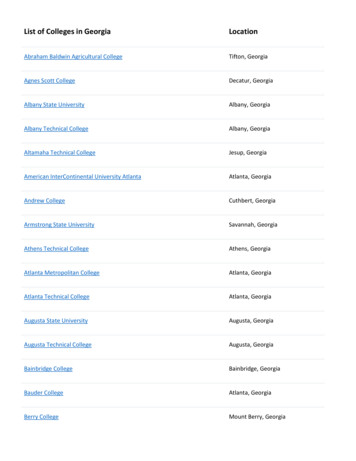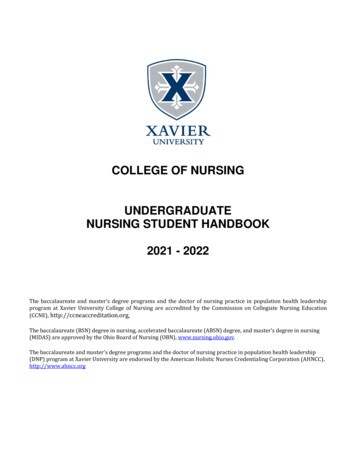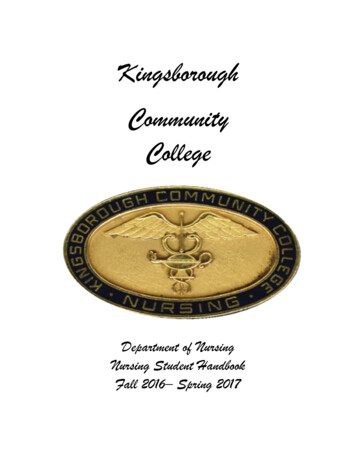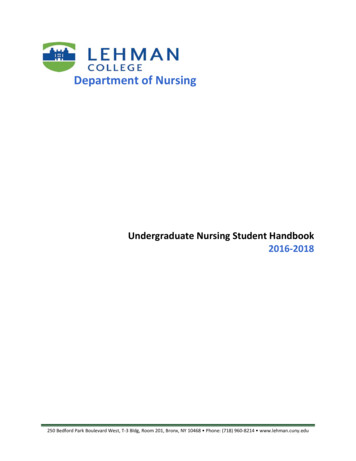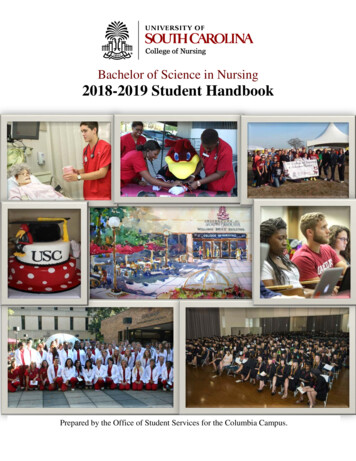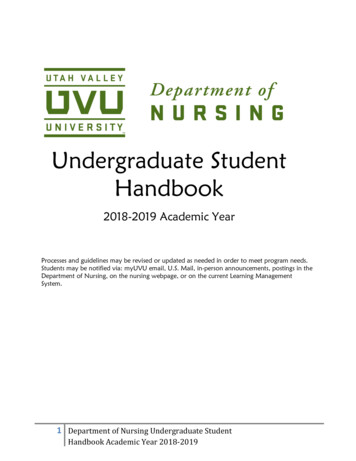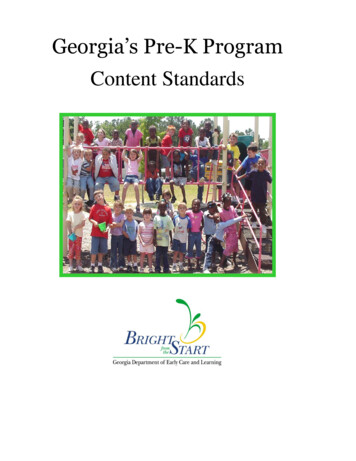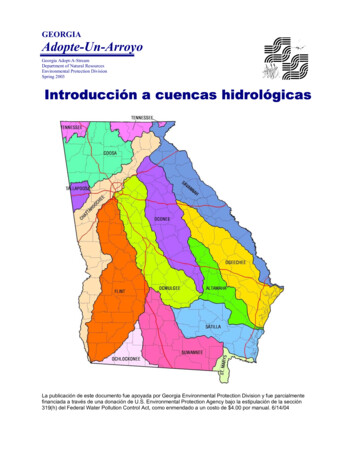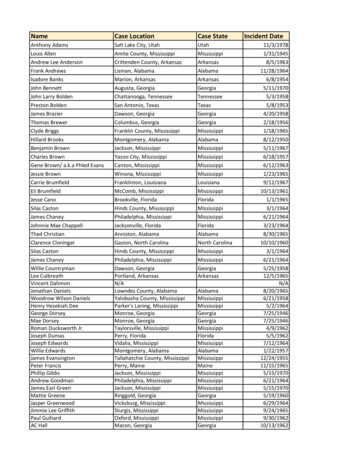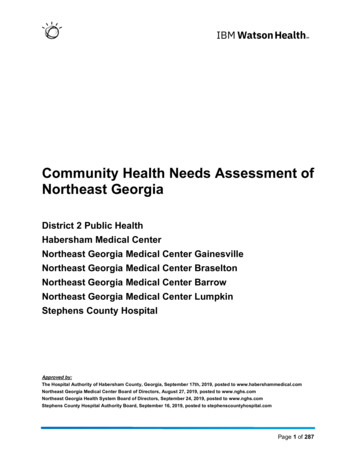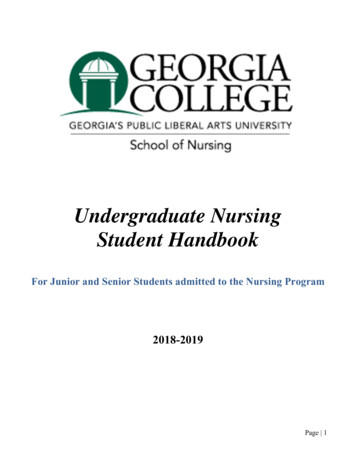
Transcription
Undergraduate NursingStudent HandbookFor Junior and Senior Students admitted to the Nursing Program2018-2019Page 1
ContentsWelcome to the Nursing Major . 2Purpose of the Undergraduate Nursing Student Handbook . 2Georgia Board of Nursing Approval and CCNE Accreditation . 2General Information . 3University Office Hours . 3Library/Instructional Technology Center Link . 3As a nursing student, where do I find .?. 3School of Nursing Mission & Vision . 4Philosophy . 4Conceptual Definitions for the Organizing Framework . 5Program Concepts . 6Program Concept Definitions . 6Undergraduate Program Outcomes . 8ANA Code of Ethics for Nurses . 8Academic Advising/Mentoring. 8Nursing Policies and Procedures . 9Testing Policy . 9Campus Laboratory Policy & Guidelines . 12Dress Code. 17Standard & Transmission-Based Precautions . 20Student Accident/Injury Policy . 30BSN Admission, Progression & Dismissal . 34Substance Abuse- Nursing Students . 38Student Signatures for Charting . 39BSN Student Orientation & Onboarding Process . 40SON Approval Process for Special Projects . 421
Welcome to the Nursing MajorWelcome to Georgia College & State University, the College of Health Sciences, and the School ofNursing. At Georgia College, tomorrow’s nurses are educated as if lives depended on it! Students areuniquely prepared for nursing through liberal arts integration in the curriculum leading to students’understanding of clients as unique, holistic individuals.As a student of nursing you will be challenged to acquire the scientific knowledge base and criticalthinking skills of the discipline of nursing, internalize the behaviors of a professional nurse, developtechnical and decision-making skills, incorporate ethics into your practice, and develop awareness ofyour own and others' value systems as a context for professionalism. This will require hard work andcommitment on your part but will be a remarkable experience you will treasure for a lifetime, resultingin a career that will give you an endless sense of having made a difference in the world.This will be an incredible journey. We are excited that you have chosen GCSU for that journey and we,the faculty, will do everything we can to support your success as we take the journey alongside you. The Nursing Faculty Purpose of the Undergraduate Nursing Student HandbookThis handbook, prepared for undergraduate students admitted to the nursing program, provides specificinformation about nursing that supplements – but does not replace – the University’s UndergraduateCatalog. You are expected to read this handbook, abide by the policies, and be directed by its manyfeatures to help you be successful in the nursing major. As a part of your orientation to the BSN programyou will be required to take a validation exam that indicates your receipt, review and intent to follow thepolicies in this handbook.Georgia Board of Nursing Approval and CCNE AccreditationThe School of Nursing is fully approved by the Georgia Board of Nursing. The BSN program leads to aBachelor of Science Degree with a major in Nursing. Approval by the GBON means that BSN graduatesare eligible to take the NCLEX-RN --- the national licensure examination is required for becoming aRegistered Professional Nurse.The contact information for the Georgia Board of Nursing is:237 Coliseum DriveMacon, Georgia 31217478-207-2440The baccalaureate degree program in nursing at Georgia College & State University is accredited by theCommission on Collegiate Nursing Education ,655 K Street, NW, Suite 750, Washington, DC 20001,202-887-6791.2
General InformationCollege of Health Sciences, School of NursingMilledgeville Campus – (478) 445-5122 or 1076231 W. Hancock St.CBX 063Milledgeville, GA 31061Dean, College of Health Sciences:Dr. Sandra K. Gangstead Office located at 131 Parks Memorial ;Telephone (478) 445- 4092 Administrative Assistant:Ms. Valencia Edwards (478) 445- 4092Interim Associate Dean, College of HealthSciencesDr. Sallie CokeDirector, School of NursingDr. Deborah MacMillan Office located at 234 Parks MemorialBuilding; Telephone (478) 445-1795 Administrative Assistant to the Director:Mrs. Tracy Fathi (478) 445-5122Assistant Director, School of Nursing,Undergraduate ProgramsDr. Debbie Greene Office located at 232 Parks MemorialBuilding Telephone 478 445-5152University Office HoursGeorgia College & State University offices Office located at 131 Parks Memorial;Telephone (478) 445-2633Monday – Friday8:00 a.m. – 6:00 p.m.Library/Instructional Technology Center LinkLibrary and Instructional Technology CenterAs a nursing student, where do I find .?Progression/Graduation RequirementsUniversity CatalogUndergraduate Nursing Student Progression Policy(in this handbook)Specific information about nursingUndergraduate Nursing Student HandbookAnnouncements, memos, policy updates Official Bulletin Board, 2nd floor Parks Memorial,Bobcats emailCourse materials, information,GeorgiaView, Course Facultyannouncements, personal grades &communicationsLibrary and Instructional TechnologyLibrary and Instructional Technology CenterWays to communicate concerns orFaculty; Advisor; Elected Student RepresentativesproblemsGraduation Information, Registrar &Registrar link & Degreeworks; AdvisorAcademic Advisor3
School of Nursing Mission & VisionMissionIn concert with the Georgia College liberal arts mission, the School of Nursing is committed to theformation of nurse leaders to engage in evidence-based practice, lifelong learning, and civic participationin a health information intensive environment through the development and mastery of clinical reasoning,professional nursing skills, and values. The BSN program prepares nursing professionals who are lifelong learners and have the knowledge and skills to support the healthcare needs of diverse populations.VisionThe Georgia College School of Nursing aspires to be recognized as a national leader in nursingeducation. Georgia College nurses will serve at the forefront of the changing healthcare delivery system.PhilosophyGeorgia College’s School of Nursing builds the philosophy by defining the basic concepts that comprisethe discipline and science of nursing. These concepts are health, nursing, environment, education, andperson.HealthHealth is the dynamic integration of the physical, psychological, spiritual, cognitive, and socio-culturalwell-being of individuals, families, groups, and communities. The meaning of health varies betweenindividuals and cultures, and is universally accepted as more than being free of disease or infirmity.NursingNursing is the protection, promotion, and optimization of health and abilities, prevention of illness andinjury, alleviation of suffering through the diagnosis and treatment of human response to actual orpotential health problems for health promotion, disease prevention, and advocacy in the care ofindividuals, families, communities, and populations.(Nursing's Social Policy Statement, Second Edition, 2003, p. 6 & Nursing: Scope and Standards ofPractice, 2004, p. 7)EnvironmentThe environment is the accumulation of physical, physiological, social, cultural, spiritual, economic, andpolitical conditions that interact with and influence the human experience. The interaction is constant andthe environment can be altered to influence health outcomes.EducationNursing education is an active process where the student develops and masters clinical reasoning,professional nursing skills and values that enable graduates to thrive in a health information intensiveenvironment. The minimal level of education for entry to professional nursing practice occurs at thebaccalaureate level and mastery occurs through graduate education and life-long learning. Clinical reasoning is a cognitive process of thinking where data is reviewed and analyzed to improvehealth outcomes.4
Professional nursing skills are developed through integration of theoretical knowledge and guidedclinical practice. Professional nursing values are the consistent demonstration of altruism, autonomy, human dignity,integrity, and social justice.PersonPerson is a complex, unique, holistic individual with inherent worth and dignity. The meanings a personattaches to life experiences are influenced by the environment, developmental level, group membership,culture, and ethnicity. The person has the power to identify their own life choices.Conceptual Definitions for the Organizing FrameworkThe organizing framework provides faculty and students with a way of conceptualizing and organizingknowledge, skills, values, and beliefs (Billings & Halstead, 2009). This framework facilitates the creationof courses and the organization of the courses into a cohesive curriculum that enables students to achievethe desired learning outcomes.In 1860 Florence Nightingale first published “Notes on Nursing” in the United States (Nightingale, 2008).From her writings, the concepts of person, environment, nursing, and health have been drawn. Theseconcepts are still considered to be the cornerstones of many nursing theoretical models (Billings &Halstead, 2009). The following statements are Georgia College’s own unique perspectives related to theseconcepts as they are reflected in our curriculum.Person: The person is conceptualized holistically as a system, whether individual, family, group, orcommunity. Viewing persons in a holistic manner involves appreciation of the biological, psychological,sociocultural, spiritual, and developmental dimensions that make the person unique, unprecedented, andunrepeatable.Environment/Society: The curriculum reflects concepts revealing an interaction between persons andtheir environment, which has the potential to impact their health. An evolving care system has developedwithin the context of the socioeconomic, political, and global environment. The system constantly changesin an attempt to meet the health needs of the populations. Nursing demands a professional who is able toserve as client advocate or change agent to assure that clients have access to quality care that is satisfyingand cost effective.Nursing: The curriculum reflects selected concepts and processes to construct the meaning ofprofessional nursing practice. At the undergraduate level, nursing is conceptualized as a profession thatinvolves practice as a generalist while the graduate program prepares the professional nurse for practicewithin a prescribed nursing specialty.The Bachelor of Science in Nursing (BSN) graduate is prepared for beginning roles caring for individualclients throughout the lifespan in a variety of settings, and for families, groups, and communities as clientsand to assume a beginning leadership role in nursing. The Master of Science in Nursing (MSN) programbuilds on the generalist foundation of the baccalaureate nurse and extends the breadth, depth, and scope ofnursing education to inform practice. MSN graduates and students completing postmaster’s programs areprepared to assume leadership roles as family nurse practitioners. The Doctor of Nursing Practice (DNP)program prepares nurse leaders for evidence-based practice in both direct patient care and executive roles.5
This requires competence in translating research into practice, evaluating evidence, applying research indecision-making, and implementing viable clinical and organizational innovations to change practice.Health: In order to understand health as a dynamic multidimensional state, the curriculum exploresselected concepts: holistic health, outcomes management, and global health. Holistic health as a humanvalue occurs within the text of a diverse interconnected individual, family, group, and community.Holistic health encompasses health promotion, maintenance, and restoration, achievable throughcollaborative communication, empowerment, advocacy, and access to health care. The outcomes from thedelivery of health care are managed to improve the quality of life and reach the maximal potential of theindividual, family, and community. Global health incorporates a worldview in which humankind isinterconnected and cultural diversity is appreciated.Program ConceptsThe curriculum for undergraduate and graduate programs is designed around ten nursing-practiceconcepts: 1) communication, 2) evidence-based practice, 3) leadership, 4) ethics, 5) cultural diversity, 6)health promotion & disease prevention, 7) advocacy, 8) collaboration, 9) information science/informatics,and 10) professional role.Program Concept DefinitionsCommunication is a two-way process of sending and receiving meaningful information that goes beyondthe simple transfer of information to the establishment of a relationship between people (Blais & Hayes,2011).Evidence-based practice is a the conscientious, explicit, and judicious use of current best evidenceapplied to improve the quality of clinical judgment in making decisions about the care of individualsmoderated by patient circumstances and preferences (Blais & Hayes, 2011; Sackett, Rosenberg, Gray,Haynes, & Richardson, 1996).Leadership shapes and shares a vision, by inspiring, enlivening, and engaging others to participate inbuilding consensus for goal achievement (Blais & Hayes, 2011; Kelly, 2008).Ethics is a branch of philosophy that provides an integral part of the foundation of nursing. A code ofethics makes the primary goals, values, and obligations of the profession explicit. It is an expression ofnursing’s own understanding of its commitment to society. (Fowler, 2008, p. 145).Cultural Diversity is respect, understanding, and sensitivity to the needs between and within culturalgroups. Individual diversity may include but is not limited to race, ethnicity, age, religion, gender, sexualorientation, primary language, disability, veteran status, national origin, geographical background andeconomic status. Diversity extends beyond acceptance; it is the exploration and understanding ofindividual’s uniqueness and differences in a safe, non-judgmental, and caring environment (Blais &Hayes, 2011) (College of Health Sciences).Health Promotion & Disease Prevention is the protection, promotion, and optimization of health andabilities, prevention of illness and injury, alleviation of suffering through the diagnosis and treatment ofhuman response, and advocacy in the care of individuals, families, communities, and populations (alsoANA definition of nursing) (American Nurses Association, 2010a, p. 1).6
Advocacy is a practical partnership between a professional who has expertise to offer to the client who isexperiencing inherent ambiguity associated with significant health concerns (Joel, 2009, p. 263).Collaboration is a professional healthcare partnership grounded in a reciprocal and respectful recognitionand acceptance of: each partner’s unique expertise, power, and sphere of influence and responsibilities;the commonality of goals; the mutual safeguarding of the legitimate interest of each party, and theadvantages of such a relationship (American Nurses Association, 2010b, p. 64).Informatics is a combination of computer, information and nursing sciences that facilitates themanagement and processing of nursing data, information and knowledge and supports the practice ofnursing (Staggers & Thompson, 2002, p. 227).Professional Role is the role of a nurse that uses a distinct body of knowledge, university-basededucation, specialized practice, standards of practice, a social contract, and an ethical code (AmericanNurses Association, 2010b, p. 15).7
Undergraduate Program Outcomes1. Provide leadership within the healthcare team to ensure safe, effective, patient-centered care in avariety of settings.2. Integrate liberal arts foundation, scientific evidence, and clinical reasoning into nursing caredelivery for diverse individuals, families, and populations.3. Incorporate life-long learning, ethical principles, health policy, and professional standards intosocially responsible care for individuals, communities and populations.4. Provide compassionate, competent, holistic nursing care across the lifespan.5. Demonstrate effective communication through writing, speaking, listening, and using technologynecessary for collaboration and quality nursing care.6. Advocate for improved population health initiatives and systems of health care delivery locally,nationally, and globally.ANA Code of Ethics for NursesAll professional nurses are expected to provide ethical care. All students should review the AmericanNurses Association (ANA) Code of Ethics for Nurses at this s/Academic Advising/MentoringStudents are advised according to the procedure described in the Georgia College & State UniversityUndergraduate Catalog. Students are advised in the advising center. Additionally, faculty mentors willbe available based on the interests of the student, for example, nursing student organizations,undergraduate research, and study abroad activities.8
Nursing Policies and ProceduresPolicy/Procedure Title: Testing PolicyPolicy #1000Referenced policy: 1102 Course and Clinical Guidelines;SON Student Handbook Proctor GuidelinesApplies tox BSN x RNBSN x MSN x DNP FacultyNFO InitialApproval Date:3/17/2017Policy Committee Review Dates (every 3 years):NFO Approved Revision Dates:Policy Statement:The purpose of this policy is to provide information and guidelines to nursing students regarding testing in theprogram.Policy:This policy provides guidelines to students regarding the administration of exams in the nursing programs.Procedures:1.Academic IntegrityStudents will adhere to the Student Academic Dishonesty section outlined in the Georgia College & StateUniversity Student Handbook.To ensure exam security, the following procedures will be followed:1.Course exams are the property of GCSU and the SON. Computer based tests may not becopied in any form or emailed. Removal of exams, or exam content, from the testing site is inviolation of the university Honor Code and is associated with penalty accordingly.2.Students will leave all personal items at the front of the classroom. Students will be allowedto carry pencils.3.An instructor provided calculator or the computer calculator may be used.4.All paper used during the exam will be turned in at the end of the exam. If other items areallowed they will be specified by the individual instructor.5.Caps or hats with a brim of any kind may not be worn by students during exams.2. Exam Scheduling9
1.Unit exams in nursing courses are administered at regular intervals during each semester, asindicated in each course calendar. Final exams are administered as scheduled in the GeorgiaCollege & State University Academic Calendar.2.Students are expected to adhere to the scheduled time for unit and final exams. Requests totake exams at times other than those scheduled must be submitted in writing to the coursecoordinator responsible for the course prior to the day of the exam. The course coordinator willconsult with the course faculty and notify the student of the decision.3.Students who have a personal emergency such as illness, death of a family member or afuneral, and will be absent on the day of a scheduled exam must contact the course coordinatorprior to the exam. Documentation supporting emergency absence may be required.4.Missed exams:1. Course policies vary re: make-up exams. Consult the course syllabus for missed examcourse requirements.2. GCSU policies regarding missed exams by student athletes will be followed.3. GCSU policies regarding missed exams due to religious holidays will be followed.3.Exam Administration1.Course exams will be given on the selected computer testing program approved by theSchool of Nursing. Currently the approved programs are GeorgiaView and Examsoft.2.Student may use one blank page of paper to use during the exam. Students must write theirname on the page and submit the page to faculty/proctor upon leaving the testing room.3.Once the exam has started, no questions are permitted. Students may record questions onblank page of paper during exam as needed.4.Exam grades will be released in GeorgiaView within one week of the exam after facultyreview and analysis of item performance.5.Standardized testing using HESI examinations are used throughout the program. Thecost of these exams is included in student course fees. Students may be required to purchase retestexams when required.6.Some courses may permit outside proctors. Refer to proctor forms specific to each program.4. Test Review1.Test review provides the student with the opportunity to learn from the testing process. Byanalyzing how or why a certain conclusion was reached, students have the opportunity to examinetheir thought processes.10
2.In testing conducted on the computer for the BSN program, test review of incorrect itemswill immediately follow the testing process. It is the individual student’s responsibility to reviewthe rationales provided for each question at the end of the test.3.Faculty in RN/BSN, MSN and DNP programs will determine the test review processes.5. Drug Calculation Exams (Pre-licensure BSN only)1.Drug Calculation Exams are required with many undergraduate courses. These exams maybe given using paper/pencil or online.2.In order to maintain a minimum level for competent performance, the drug calculationexam must be passed with a score of 90%.3.Students who do not achieve the required score on the first attempt will have a secondattempt to achieve the required score.4.Students are responsible for remediating and contacting the course coordinator to schedulea retake of the exam prior to the first clinical day for the course.5.Successful completion of the drug calculation exam must be achieved prior to beginningclinical experiences. Students who do not achieve the required score on the subsequent attempt willhave to withdraw from the course.6. HESI Examinations (Pre-licensure BSN only)The SON uses HESI (Health Education Systems Incorporated) testing throughout the curriculum to assess corecompetencies and benchmarks for the nursing program in an effort for preparation for the NCLEX exam. Allclinical courses have either a custom or specialty exam that counts as a portion of the course grade. Facultyrecommend that students achieve a score of 900 or greater. A comprehensive HESI Exam is used as the ExitExamination for the School of Nursing at GCSU.The Exit Exam is administered as a course requirement in NRSG 4981 – Integrated Clinical Concepts (1-0-1). Twoopportunities will be given for students to sit for this exam. Students who fail to receive a sufficient score to make apassing grade in this course must re-enroll during the next term if they have not failed a previous nursing course. Ifthey have previously failed a nursing course, failure of NRSG 4981 will constitute their second failure. Refer toCourse & Clinical Information policy #1102.The cost of the HESI exams are covered through the course fees. Students will have access to case studies,NCLEX style practice questions, and remediation materials through the Evolve site. Students will be providedinformation about accessing these materials during the first week of classes. Students are advised to purchase theHESI Comprehensive Review for the NCLEX RN Examination to use throughout the program.Additional fees may be required for HESI testing if more than one exit exam is needed.11
Policy/Procedure Title: Campus Laboratory Policy & GuidelinesPolicy #1001Applies tox BSN RNBSN x MSN DNP x FacultyNFO InitialApproval Date:Policy Committee Review Dates (every 3 years):11/18/2016NFO Approved Revision Dates:Policy Statement:The goal of this policy is to support safety and professional practice in campus laboratory activities.Policy:1. Standard & Transmission-based Precautions: Policy #1003 will be followed at all times inthe campus laboratory.2. All students and faculty will follow the procedures established in this policy to supportsafety and professional practice.Procedure:1. Use of Needles During Campus Laboratory1. Students may use needles and syringes to practice administering subcutaneous andintramuscular injections on inanimate objects. Used needles are to be disposed of in thesharps disposal boxes provided in the lab.2. After verification of skills by clinical instructor and under faculty supervision,students are allowed to administer flu vaccines to fellow student/faculty/staff usingsterile syringes and needles. A consent form must be signed by the person receivingthe injection before it is given.3. Needles are not to be removed from the lab.2. Use of Lancets During Campus Laboratory--Students are allowed to perform blood glucosetesting on classmates using sterile lancets.3. Sharps Disposal1. All sharps (needles, lancets, etc.) are to be disposed of in the sharps disposal boxesin the lab.12
2. When a sharps disposal box becomes full, students are expected to lock (snap shut)the container, place it in the area designated by the lab coordinator, and replace it with anew sharps disposal box. The used containers are picked up by Environmental Health& Occupational Safety on a regular basis and disposed of according to OSHAguidelines.4. “Clean” Needle Stick—in the event of a “clean” needle stick, the lab instructor should benotified so that first aid can be provided.5. Bloodborne pathogen exposure-in the event of a contaminated needle stick or other sharpsinjury, blood splash, or other potentially infectious contact with body fluids, wash the site withsoap and water and notify the faculty member or preceptor immediately. An Incident/InjuryReport (Policy #1004) will be filled out by the instructor and the student will be sent to thenearest Emergency Treatment Center for follow up. Policy #1003 Standard and Transmissionbased Precautions will be followed.6. Other Injury: Follow Policy #1004 Incident/Injury Report7. Simulation1. The simulation experience is interactive with manikins and task trainers.2. All equipment is to be handled carefully.3. Manikins are to be treated as if they were living patients.4. No ball point pens, felt tip markers, or Betadine are to be used on the manikins;these will cause permanent staining.5. Any student who is allergic to Latex must wear Latex-free gloves while touchingthe manikins.6. In order to provide an effective learning experience for future participants, allstudents must agree to keep their simulation experiences confidential. Students maybe required to sign a confidentiality agreement before simulation exercises.8. Simulation experiences and class clinical review/practice labs are considered clinicaldays. Students are required to adhere to the School of Nursing’s dress code policy, and bringequipment that would be used in the hospital (stethoscope, watch with second hand, etc.).9. Media, Equipment, and Supplies Sign-Out and Return (Milledgeville campus lab):1. A “Nursing Lab Check-Out Log” is available for students and faculty to sign outitems.2. The date, name of person, phone number, email address, and description of item(s)checked out must be entered in this log.13
3. Any item checked out is to be returned in the same condition. If an item is returneddamaged, the person responsible must reimburse the lab for damages.4. If the item is not returned by a student by the end of the semester, an academic holdwill be placed on the student’s record until the item is returned or the lab is reimburse
The Georgia College School of Nursing aspires to be recognized as a national leader in nursing education. Georgia College nurses will serve at the forefront of the changing healthcare delivery system. Philosophy Georgia College's School of Nursing builds the philosophy by defining the basic concepts that comprise
